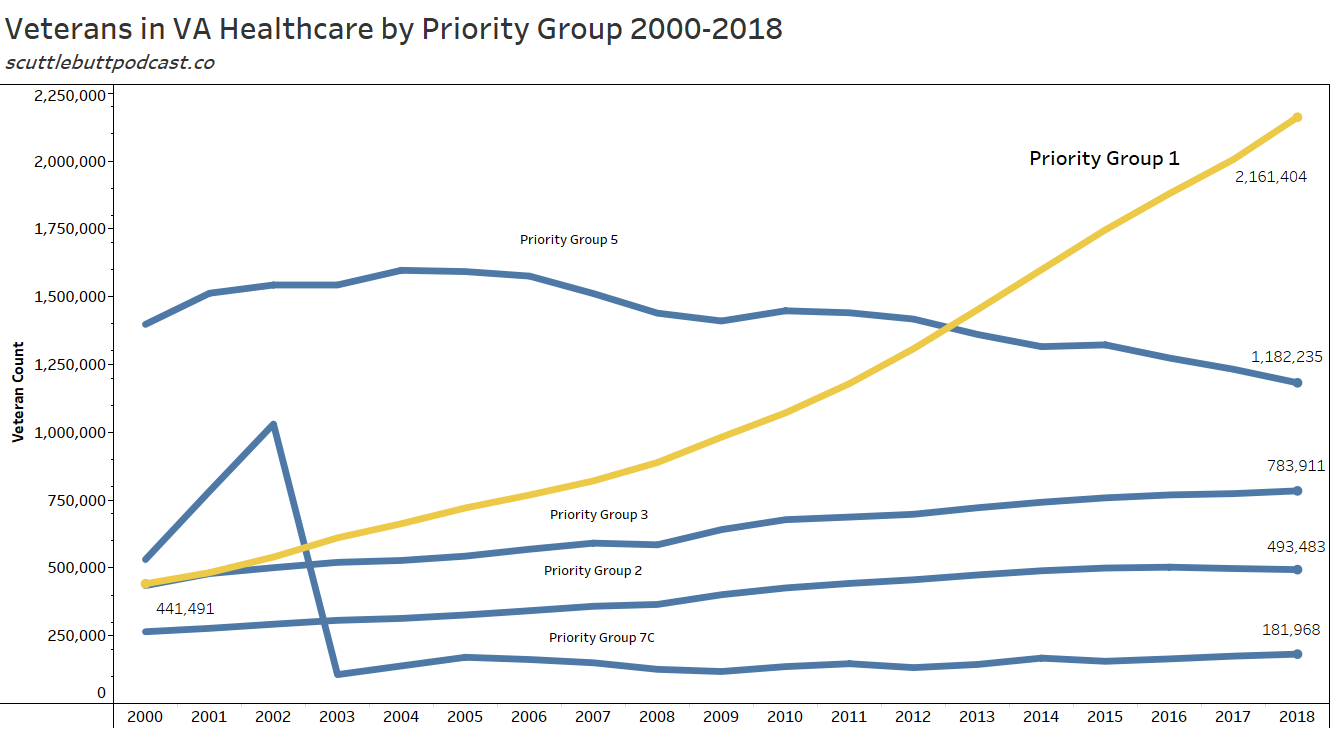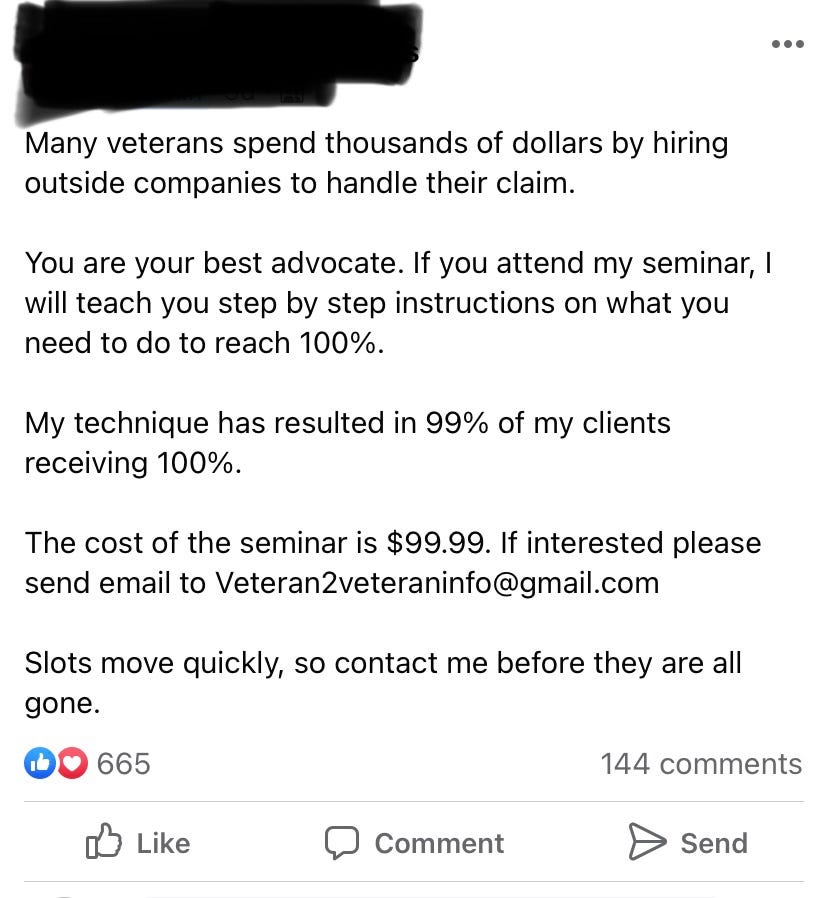4-1-1 and Big Questions on VA Healthcare
Good morning. Thanks for sharing a bit of your Saturday morning with me.
Every 3-4 months I have a near complete mental crisis about my lack of attention to consistent writing. As I continue to juggle more tasks, both personally and professionally, I’ve found the need to systematize much of what I do around the podcast and distribution of it which I’ve found incredibly helpful. Currently I have as large of whiteboard as you can buy laying in my office with the next month of dates written out describing what I will post about and when. Oddly satisfying.
I’m going to assign a structure to this which I believe may make this easier to write when I know what I have to write. Staring at a blank sheet, despite having the hordes of overseas workers powering chatGPT at my fingertips, is still a challenge.
Proposal: Weekly 4-1-1.
4 interesting things I read or listened to.
1 think piece or research
1 thing I’m working on
Here goes.
4 - Interesting Reads and Listens
An interesting article written from the perspective of an Army judge who is looked to for approval to engage with enemies from a legal perspective. It offers takes on finding moral injury in different places.
“I wonder whether distance from mortal danger adds gravity to one’s moral responsibility.”
“But factual accuracy is not the mark of moral solvency.”
It’s important to not read or learn in a bubble. I try to keep a wide aperature because you find interesting things, for entertainment or educational purposes, in unsuspecting places. This article is written by Kayla Haas, a recent follow of mine on Twitter who writes here on Substack. I’m not especially interested in drill, but I was floored with the quality of which it is written. When someone writes in a way that gets you interested in something you normally aren’t, pay attention.
A great article on Navy readiness written by former guest of the show, Bill Toti. It’s no secret the Navy fleet is light on ships without signs of change in light of budget changes. If you haven’t listened to my conversation with Bill and are a fan of military history, this would be a great listen.
This is oldish news, but the Navy plans to reopen Subic Bay, the Naval base in the Phillipines, likely to combat the growing Chinese threat.
1 - Research Piece
Last term, I conducted a research study about the prominence of PTSD in veterans. The objective was to find the effectiveness of certain drugs in clinical studies to combat PTSD in veterans and how that stacks against civilian population.
Our teacher only required that the project be something that we care about. In order to get her to care about it more, I spent a large amount of my time painting a picture with other data about VA Healthcare and challenges of medical care post military exit. It was here I found something staggering.
If you’re unfamiliar, when you exit service, you’re given the chance to make a medical claim. What you’re told is that you can be compensated via a combination of financially and with medical benefits for any medical condition that came as a result of your time in the military or was a previous condition exacerbated by your time in.
The scope of the claims process is very large and so there’s an evaluation process where you’re seen by a third party doctor (that’s another long story), you provide documentation from your medical record that supports it, and a decision is made. This is often what the VA is associated with - denying claims and wounded vets spend years in litigation trying to receive help. The process is getting better, but there’s still work to do.
If your claim is approved, you’re granted a disability percentage that puts you into a priority group. There are 8 priority groups (with a few sub groups) that indicate a disability percentage and a certain amount of other benefits based on each group. Priority Group 1 consists of vets with greater than 50% disability and it tiers down from there.
During my research, I came across a dataset from the VA showing the number of veterans in each priority group that stopped me dead in my tracks.

This graph shows that the population of veterans in priority group 1, veterans considered over 50% disabled in the eyes of the VA, has risen 390% since 2000. In comparison, the total number of veterans in the VA healthcare system has risen 85% over the same period of time (not shown).
I’ve been thinking about this statistic for months. What could be leading to such a strong increase in disabled vets? I have some speculation on legitimate drivers of the rise and some anecdotal information that raises my eyebrow.
Due to generational differences, there likely is more willingness amongst those serving in today’s military to talk about their issues with a medical provider. We’ve all heard the stories of Vietnam vets sustaining bullet wounds but refusing medical care.
There has been a slow change in the outlook of invisible wounds. PTSD falls into this category. May have nothing physically wrong, but struggle internally with different things. I’m not a doctor, but I have to believe there is a larger concern for mental health in today’s military than there was 100 years ago - or its at least being talked about more.
I imagine over time the VA becomes more lenient with its decisions on disability. A few years back, there was a large lawsuit taken to the VA for patients not getting the help or care they needed. What I believe happened as a result was the VA actually outsourcing the initial checkup for claims to a third party, VES (veterans evaluation services). Not sure that it could have been proven, but certainly feasible that VA doctor’s were pressured to not acknowledge issues because of the financial compensation tied to it. No data to back that up, just a guess.
That’s the good stuff. Those all seem to me like plausible reasons and GOOD ones for that kind of rise. If those numbers from the VA accurately reflect a population more willing to get help and get the help they deserve, I’m all for that.
There’s a dark side to this coin too. I mentioned before that people will often end up in litigation fighting their disability claims with the VA. The types of lawyers that tends to attract are about as scary as you’d imagine - ‘Better Call Saul’ types of the lawyer world because it’s easy to look at vet that needs help to defend…and also MONEY.
Without too much digging, you can find a lot of information about filing for disability. Articles like this one talk about the easiest things you can file for that you’re most likely to get.
I’m part of a veteran Facebook group where they post helpful information, updates to certain programs, and details on specifics for those who need it. It’s informative and has the numbers to prove it - over 600k members.
This post below is from the admin of the group.
Wild right? Someone charging 100$ for seminars on how to receive 100% disability. It’s not a joke either. The facebook wall of this group is littered with more “success stories” of vets receiving 100% disability than Dave Ramsey has people ringing the financial freedom bell.
There is no doubt a need for education to service members and veterans about how to file a claim and understanding how certain incidents in service can lead to harsh medical diagnoses. That can’t be understated. We need this.
Seeing posts like this leave me with more questions than answers about the true state of our disabled veteran population.
Did you catch this week’s episode?
I spoke with Kim Campbell, a former A10 pilot who had her plane hit with a missile flying over Baghdad in 2003 and managed to land her plane safely. We talk about what that did to her career, how to fail forward, and building trust on a team.
1 - Something I’m Thinking On
Two weeks ago, I was on a work call with a woman who I speak to every few months. Our conversation is always fun, lighthearted, and cheery. She knows her job well which makes my life easy. She rang me to tell me she was retiring.
Retirement is a great reason to celebrate, especially for her. She’s been with the company over 30 years. A grand accomplishment and fantastic career. She’s going to “spend more time with her grandkids and drive fast cars” (she’s a German car aficionado, I think she owns something like 3 Porsche 911’s). After congratulating her and hanging up, my heart sunk and got this feeling my family calls “getting a lump in your throat”, a feeling of intense emotion that’s typically sadness driven.
I sat in that same position for 15 minutes. Thinking.
What if this was me? What would I think?
Since exiting the Navy back in 2018, I’ve been on a journey. A journey of self discovery. One of enlightenment in some ways. Finding out what really matters. While still in the pursuit of answers, I’ve suspected that I wouldn’t ever be happy in the military long term because I couldn’t pursue what I loved. What I loved isn’t fully defined yet, but I knew the optempo, 24 hour duty, long deployments, and buzzing of my ears wasn’t it and without the space and time to think, I wouldn’t be getting closer.
Sitting in my chair, imagining myself retiring from a company after giving them 30 years of my life, I felt fear. Fear of not achieving everything I feel capable to do in this life and waging a lifetime of time clock punches to receive a measly pension to which I then spend trying to reconcile the life I should have spent living.
I see that my frustration with living a life overburdened by the agenda of the organization I serve(d) is not just reflective of the department of defense, but of the corporate world writ large. It’s difficult for me to imagine a lifetime in which I don’t spend every waking moment in service of my highest potential, something even today I know I underestimate. In practice, I think this looks like solopreneuership or working at a small, nimble organization with similar incentives and in pursuit of the change in the world we know we’re capable of. On a long enough time horizon, I think we all just want to mean something, either in this life or after.
Here’s to working on things that mean something to you.
Few closing less heavy thoughts -
I recently ordered in a metric shitload of stickers. I firmly believe in repping what you’re about. I’d love to send you some - drop your address at the link below and I’ll get some in the mail to you.
Also, Youtube. I’ve been in the process over overhauling the back catalog of episodes for Youtube as well as the best clips. I’d appreciate a subscribe if you’re a Youtube user.
/B


